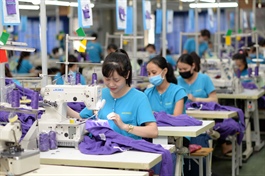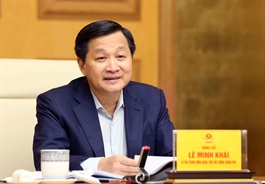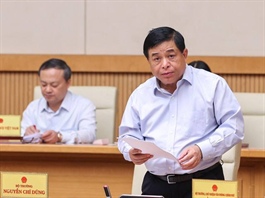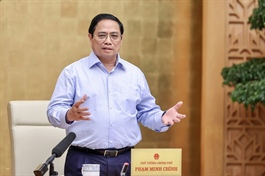Appreciating efforts to attract more overseas capital
Appreciating efforts to attract more overseas capital
Over the past decade, Warburg Pincus has been investing across Vietnam in companies that support the government’s goals of diversifying and modernising the country’s economy.
Last month, I had the opportunity to sit down with Prime Minister Pham Minh Chinh in New York City after his visit with President Biden in Washington.
After the prime minister explained his economic priorities, he asked me a simple question, one that I had not heard so succinctly put by a head of government before. What attributes do you look for in a country considering investing in?
I improvised an answer at the time, but the framework of my response captured the critical ingredients we look for – an entrepreneurial spirit, stable macroeconomic conditions, solid infrastructure – both hard and soft, and government policymakers with a practical mindset and commitment to dialogue with business and investors.
As Vietnam evolves to meet each of these challenges, it is poised for a significant transformation that will cement its reputation as an economic model for other nations in the region and around the world.
First and foremost, we seek countries with strong entrepreneurial cultures where an individual with an innovative idea and determination can build a successful business and scale it up over time.
As growth investors, we need local partners with whom we can put capital behind a plan to scale a business and who will continue to drive it after we have exited. Unlike large multinational enterprises, we invest in businesses that are designed to be locally managed and operate independently after we move on.
Our only agenda is to create a more valuable and responsible local champion that outlasts our ownership. On this front, we have been fortunate to work alongside some remarkably talented Vietnamese businessmen and women who have helped us develop industry-leading franchises in real estate, hospitality, logistics, digital payments, and banking.
The success of those entrepreneurs is creating another generation looking to chase their dreams, and we want to be their partner of choice.
Secondly, given the long-dated nature of our investments, we look to invest in countries with stable macroeconomic policies and strong growth prospects. On this front, Vietnam is extremely well-positioned.
In recent decades, the country has benefitted enormously from prudent monetary and fiscal policy, while managing the impact of the pandemic nimbly over the past two years.
While trade disruptions inevitably hit parts of the economy hard, policymakers were careful not to overreact. As many global companies seek to diversify their supply chains after the disruptions of the pandemic, Vietnam is poised to become a preferred destination for these investments.
The balanced, pragmatic approach to economic policy, along with favourable demographics, has put Vietnam and its people in a strong position to continue the economic growth that has been a hallmark of the country.
Beyond solid macroeconomics, we assess the infrastructure of countries in which we invest. Obviously, traditional infrastructure like ports, roads, and telecommunications are vital to the health of an economy, and softer infrastructure including strong public health systems and a vibrant financial sector is equally critical.
Like many emerging economies, Vietnam needs to move fast to modernise both hard and soft infrastructure to meet the needs of an evolving economy, but the government has a clear handle on the challenges ahead.
Prime Minister Pham Minh Chinh spent much of his recent US trip talking to business leaders about leveraging private capital to speed the transition to a digital economy and greener energy supply.
During his trip to the New York Stock Exchange, the prime minister clearly outlined the urgency of building more vibrant capital markets to finance expansion in the real economy.
And we had an opportunity to talk about the great importance of allowing even more foreign investment into Vietnamese banks so that they are in a stronger position to support the growth that lies ahead.
Finally, we appreciate governments where policymakers are open to a constructive conversation with businesses and investors. Throughout our time in Vietnam, we have found that they are willing to engage and listen to our concerns.
That does not mean we always see eye to eye. We have a handful of long-standing beliefs based on our experiences of how the policy framework in Vietnam could be improved to draw more investment to the financial sector and hospitality industries, among others.
And like business leaders everywhere, we would always prefer that government moved faster and was more responsive. On balance, the prime minister’s message to American business leaders was crystal clear: your success is our success.
He understands that more capital will flow into a country where it is welcomed and seen as an important element of development – creating a powerful cycle in which success creates opportunity and inspires others.
That observation, however obviously, is not always appreciated by policymakers, even in highly-developed economies where the flow of investment can be taken for granted.
And Vietnam’s recognition of that simple truth at the highest levels of government is one of the primary reasons we have a high degree of confidence in Vietnam’s future.
Our near decade-long history in Vietnam offers a microcosm of the benefits that flow from attracting foreign investment to supporting domestic companies.
Our first investment in 2013 led to the creation of Vincom Retail in partnership with Vingroup. To date, we have invested $1.5 billion US dollars in Vietnam to support innovative companies in a wide range of sectors.
In 2016, we teamed up with VinaCapital and its founder Don Lam to build Lodgis into the leading hospitality group in the country, driving growth in the important tourism sector with its portfolio of world-class hotels and resorts.
And in 2018, we partnered with Becamex to build BW Industrial into the largest real estate platform in the country, supporting the transformation of this country into a leading global manufacturer.
At that time, we also made an investment in Techcombank, and today it is now the biggest private sector bank and the largest provider of corporate bonds to support businesses as they seek to grow further.
Later that year, we began a partnership with MoMo which is now the premiere digital finance platform in Vietnam and brings modern financial services to millions of its users. In total, these sector leaders employ more than 20,000 employees up and down Vietnam.
The total equity value of the companies we helped build is more than $20 billion today, and the vast majority of those gains in value accrued to our local partners, co-investors, and the companies themselves.
We are in the middle of planning more investment in Vietnam, and just led a $ 250 million investment in real estate developer Novaland to help fuel its growth.
With a government that is committed to providing favourable tailwinds for business and asking all the right questions, we are bullish on Vietnam and look forward to a bright future.

























